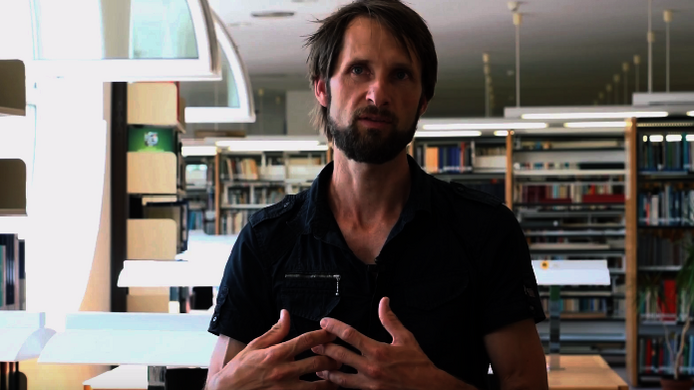Ten years of ERC: an exemplary boon for researchers

FWF: In 2015, you received the prestigious ERC Starting Grant. What does this award represent for you? Jens Blechert: Apart from the attention and the recognition it brings – which motivate and energise you – the main significance lies in the research funds made available, offering you a great deal of flexibility and independence. FWF: What has changed in your daily research routine since the award? Blechert: There have been several fundamental changes: prior to the ERC grant I had no co-workers, but now we are a research group of five people. In addition, the grant has enabled us to buy instruments and equipment without having to go through lengthy application and approval procedures. All of these are important prerequisites for successful basic research. FWF: What motivated you to apply for this prestigious award? Blechert: I learned about this ERC grant through a tip-off from a fellow researcher. Previously I had only been aware of collective applications which I felt were out of my reach. The advantage of the Starting Grant is that a researcher can actually submit an individual application independently. FWF: You are currently investigating the connections between eating behaviour and emotions, the project for which you received the ERC Grant. What concrete research issues are you exploring in that project? Blechert: We are investigating the connections between emotions, stress, following a diet and overeating. We examine that issue in everyday life and in the laboratory, involving healthy individuals as well as patients with eating disorders. We are also developing methods that are designed to help curb more effectively the desire to eat tempting foodstuffs. FWF: What made you choose this topic and what are you planning to achieve? Blechert: Research has shown that one reason for unhealthy eating or even the abandoning of a diet are negative emotions and stress. So it’s not because of a lack of good intentions, knowledge or planning. This is why we are interested in learning when stress in daily life leads to (over)eating, who is most affected (age, gender, weight, personality) and why, i.e. which brain areas and hormones are responsible for the link between stress and reward processing (food intake control). And ultimately we also want to find out how you can have a positive impact and improve the situation. FWF: What do you recommend to your students who want to embark on a career in science? Blechert: I check whether they are geographically mobile and sufficiently disciplined. If not, I recommend that they at least have a plan B. FWF: What are your wishes for your professional future and your field, psychology? Blechert: In Salzburg, the field of psychology is developing in a very dynamic and positive way. I can only wish for it to continue like that. FWF: In what direction is this development going? Psychology seems to be experiencing something of a “new boom” right now. Blechert: Psychology has benefited greatly from an orientation towards empirics, meaning the systematic collection of data from a larger cohort of patients. In medicine, too, evidence-based knowledge is given priority in many cases. Particularly in Salzburg, psychology has aligned itself strongly with natural-science or neuro-science methods and as such has grown very close to neighbouring disciplines. In the complex interactions between social, mental and biological factors, the comprehensive models of psychology have turned out to be very useful, and so they are now used in many areas of society. FWF: What role does national research funding, such as provided by the FWF, play in achieving success at the international level? Blechert: It plays a vital role. If you have no national third-party funds, this will lower your chances of getting European funds and, hence, the chances for international recognition. FWF: In your view, what is the value of basic research for a small country such as Austria? Blechert: In my opinion, basic research translates first and foremost into unencumbered, free research. Colleagues with a strong leaning towards applicability need to align the thrust of their research with their clients. As a result, science loses creativity and its innovative questioning, aspects that we need in the long term in order to understand the broader context. In that way, important insights from basic research will provide input for applications, which is something one can't plan or lay down as concrete objectives. I don’t think the size of a country determines whether top research can be conducted there or not. Given a small research area – and tight budgets – I would advise against defining too many targets, and would rather concentrate on fewer fields or current research focus areas.
Jens Blechert studied psychology at the University of Tübingen. He acquired his PhD in Basel on the topic of anxiety disorders. He conducted research on eating disorders and emotional regulation in Freiburg, Germany, and Stanford, USA, before moving to Salzburg in 2011. In 2015, Jens Blechert was appointed Professor of Neuro-Health Psychology and Director of the Eating Behaviour Laboratory at Paris-Lodron University Salzburg. He is the principal investigator of the international FWF project Emotional, restrained and bulimic eating running until 2018 and, in 2015, was awarded a EUR 1.3 million ERC Starting Grant from the European Research Council.
10 Years of ERC: the success story of basic research in Europe Promoting pioneering basic research is one of the priorities of the European Union. To meet this objective, the European Research Council (ERC) was established in 2007, funding research projects with a high innovative potential. The ERC grants give the awarded researchers the necessary leeway to translate their ideas and visions into reality. With 189 ERC grants over the past decade, Austria ranks 6th on the European list of achievers in the field of pioneering research. ERC Starting Grants are endowed with up to EUR 2.5 million, while the comparable grant from the FWF, the START award, provides up to EUR 1.2 million. With this amount, young postdocs can build their own project group over a period of five to six years. The grants are awarded in all disciplines and have no thematic restrictions.
More information





